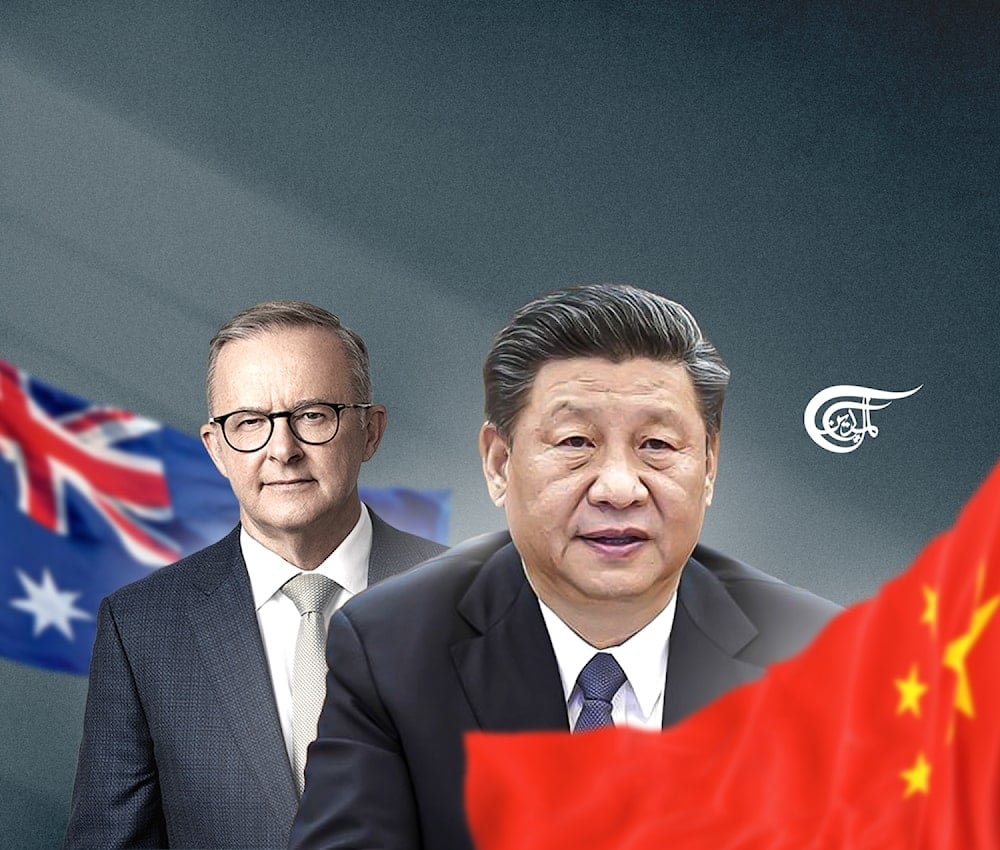Let common sense return in Australia’s China policy
Common sense tells us that stable relations between Australia and China help maintain the mutually beneficial economic ties between the two countries.
-

China-Australia relations should by no means go backward (Illustrated by Mahdi Rtail; Al Mayadeen English)
Chinese Foreign Minister Wang Yi’s visit to Australia this week is the latest sign of a thaw in the relations between Beijing and Canberra. When the two sides managed to arrange a meeting between Xi Jinping and Anthony Albanese on the sidelines of the 2022 G20 Bali summit, the Australian PM suggested that the meeting was in and of itself a successful outcome. His comment had a point at the time, given the challenges encountered by the bilateral relations when his predecessor Scott Morrison was in office. Australia has many reasons to cherish the relations’ upward trajectory at the moment.
This year marks the 10th anniversary since China and Australia signed a Comprehensive Strategic Partnership (CSP). From China’s perspective, this official definition of relations has multiple connotations. “Comprehensive” requires the two sides to cooperate in as many areas as possible. “Strategic” means that how their relations develop could generate implications that go beyond the two countries. A bottom line for “partnership” is that the two sides can’t view each other as adversary.
However, Australia has previously taken moves against China that were not in line with CSP’s spirits, such as banning Huawei from its 5G network in 2018 and calling for a so-called Covid inquiry in 2020. The latter, for example, was a political move catering to an anti-China sentiment, rather than a meaningful step that made scientific sense.
Those moves were taken by Canberra with an awareness that, for certain products such as iron ore, China had no good alternative to buying them from Australia. Frankly, that has set a bad precedent of taking the trade opportunities provided by China for granted and even abusing them. Think about a scenario like this: If a shop keeps offending a customer, knowing he or she has to buy some products from it anyway, how would this customer feel? Any normal person would probably seek to reduce purchases from this shop, especially on items that can be found elsewhere. That’s exactly how China responded to Australia’s hostility.
Fortunately, after Albanese took office, cool heads have to some degree returned to Canberra’s China policy. After meeting Xi in Bali, Albanese paid a visit to China last November. That trip saw him attend an annual import expo held in Shanghai, which sent a message that Australia cares about trade with China. A high-level official dialogue mechanism resumed last year following a three-year suspension. Australia has also announced that, after a security review, it would not cancel a Chinese company’s lease of the northern port of Darwin.
A fundamental aspect of China-Australia relations is that they are two highly complementary economies. Natural resources from Australia help power factories in China, and there are plenty of Chinese consumers who love Australian wines and agricultural products. For Australia, trade with China is worth more than its trade with the US, Japan, and South Korea combined. During the 2008 global financial crisis, Australia was the only major economy in the West to avoid a recession mainly because of its exports to China. The status quo in their economic and trade ties is unlikely to change significantly in the foreseeable future. For instance, bilateral trade in goods grew by over 8% in 2023, and China continues to be the largest source (over 20%) of international students for Australia’s education sector. Common sense tells us that stable relations help maintain the mutually beneficial economic ties between the two countries.
On security matters, it looks like Canberra will continue to align with Washington, and there are several specific issues on which Beijing and Canberra don’t see eye to eye with each other. China is not against the Australia-US alliance per se. However, there is every reason to believe that the US is taking advantage of this alliance to counter China, if, as one example, we think about the development of the AUKUS. Apart from a concern about the potential threat to its own national security, China is also – perhaps even more – worried about the prospect of AUKUS contributing to a nuclear arms race in the Asia Pacific, and this legitimate concern is shared by regional countries, such as Malaysia and Indonesia. Under AUKUS, Australia is in essence exploiting a loophole in the rules of the International Atomic Energy Agency to access naval reactors. No non-nuclear-weapon state has done this in the past, and the risk of nuclear proliferation is real.
In fact, a closer alliance with the US at the cost of relations with China doesn’t serve Australia’s best interests. University of Technology Sydney’s Australia-China Relations Institute once conducted a study in 2021, when China-Australia relations were at a low point. The study found that the value of 12 categories of Australian exports to China fell by $12.6 billion in the first nine months of that year compared with 2019. During the same period, however, the value of US exports of the same commodities to China increased by $4.6 billion. In other words, in terms of trade, the US was a main beneficiary of the bad China-Australia relations at the time.
With that in mind, it’s probably not surprising when a recent poll by The Guardian found only one in five Australians said their country should be primarily an ally of the US. By comparison, almost twice as many respondents believed that Australia should be an independent middle power with influence in the Asia-Pacific region. Such a pattern in the public opinion ought to be taken seriously by Australia’s foreign policy decision-makers. To say the least, China-Australia relations should by no means go backward to its previous lows.

 Ding Heng
Ding Heng
 6 Min Read
6 Min Read











